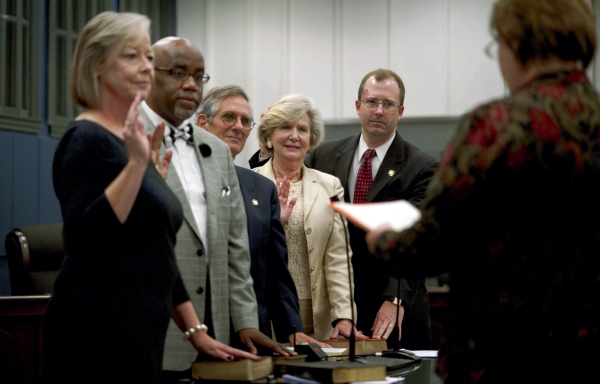Editorial: Voters should select mayor
Published 12:21 pm Thursday, June 22, 2017

- City Clerk Myra Heard, right, administers the oath of office to Salisbury's City Council in 2015, which then included, from left, Maggie Blackwell, Kenny Hardin, David Post, Karen Alexander and Brian Miller. Jon C. Lakey/Salisbury Post
This editorial first appeared in the Salisbury Post on Dec. 8, 2015.
President Lyndon Johnson led the country through turbulent years — times of assassination, civil unrest, the Vietnam War and more.
Johnson had a way of keeping his troubles in perspective, though. “When the burdens of the presidency seem unusually heavy, I always remind myself it could be worse.” Johnson said. “I could be a mayor.”
Uneasy lies the head that has to deal with streetlights, trash pickup and barking dogs.
Perhaps that’s not the best build-up to giving someone a pat on the back, but Mayor Karen Alexander deserves congratulations for being chosen by her fellow City Council members to lead Salisbury. She fulfilled the traditional criteria of receiving the most votes in the November election. Alexander also has energy and enthusiasm for the job. She appears eager to move Salisbury forward.
At least two good arguments can be made in favor of continuing this method for choosing the mayor. First, it has worked well. The city has a history of hard-working, well-respected mayors who served the city with distinction.
Second, when people hoping to serve as Salisbury’s mayor fall short of top vote-getter, they still get to serve on the council, as long as they make it into the top five. Under the conventional way of electing a mayor, someone has to lose — someone who might have made a good council member.
Still, the City Council should study mayoral elections and longer, staggered terms. Under the current set-up, an entirely new council could sweep in all at once and wreak havoc. Staggered terms ensure stability; they could also allow some council members to run for mayor when their own terms aren’t up.
Most cities let voters directly elect the mayor from candidates who actively campaign for what is a very time-consuming job. More than once, Salisbury’s top vote-getter was someone who never served on the council before. Again, Salisbury has had good luck with that; Susan Kluttz, Salisbury’s longest-serving mayor, was one of those newbies. But luck, like hope, is not a strategy.
The price for sticking with Salisbury’s method is invisible but very real. People who might have put in long council careers stepped down at the end of one or two terms as accidental mayor because they didn’t have time for the job. Paul Woodson says he spent 40 to 50 hours a week on city duties during his two terms as mayor.
More important, the current system deprives Salisbury voters of the power to directly choose the city’s most important public official. That was good enough for a long time; it may even have worked well this year. But if Salisbury is to be a truly modern city, the council needs to give more power to the people.

